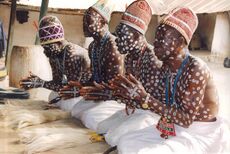Religion:Ọlọrun
| Ọlọrun | |
|---|---|
King of the Heavens, Supreme King of the Gods, Sky, Earth, Universe | |
| Member of Orisha | |
 Obatala Priests | |
| Other names | Olorun, Olodumare, Olafin-Orun |
| Venerated in | Yoruba religion, Umbanda, Candomble, Santeria, Haitian Vodou, Folk Catholicism |
| Region | Yorubaland, parts of Latin America |
| Ethnic group | Yoruba |
Olorun (Yoruba alphabet: Ọlọrun) is the ruler of (or in) the Heavens in the Yoruba religion. The Supreme God or Supreme Being in the Yoruba pantheon, Olorun is also called Olodumare (Yoruba alphabet: Olódùmarè).
In Yoruba culture, Ọlọrun is credited with creating the universe and all living things. Ọlọrun is frequently perceived as a compassionate entity who protects its creations and is thought to be omnipotent, omniscient, and omnipresent. Humans do not worship Olorun directly; there are no sacred areas of worship, no iconography, nor ordained person. Olorun is outlying, distant, and does not partake in human rituals. There are no shrines or sacrifices dedicated directly to them, although followers can send prayers in their direction.[1][2]
Olorun has no gender in the Ifá Literary Corpus, and is always referred to as an entity who exists in spiritual form only. [3][4] Christian missionaries, such as Bolaji Idowu, aimed to reinterpret traditional Yoruba culture as consistent with Christian theology as a way of pushing conversion. The first translation of the Bible into Yoruba in the late 1800s by Samuel Ajayi Crowther controversially adopted traditional Yoruba names, such as "Olodumare/Olorun" for "God" and "Eshu" for the devil, and thus began associating Olorun with the male gender.[3]
For Yoruba traditions, there is no centralized authority; because of this, there are many different ways that Yoruba people and their descendants or orisa-based faiths can understand the idea of Olorun.[1]Template:Orisa-Ifá sidebar
Historically, the Yoruba worship Olorun through the agency of the orisa; thus there is no image, shrine or sacrifice made directly towards Olorun.[1] There is some controversy about whether Olodumare is directly worshiped, due to their aloofness from humanity.[5][6] However, there are those who also worship Olodumare directly. Olodumare is the origin of virtue and mortality, and bestows the knowledge of things upon all persons when they are born. Olorun is omnipotent, transcendent, unique, all knowing, good, and evil.[5] These orisa or orishas are supernatural beings, both good (egungun) and bad (ajogun), who represent human activity and natural forces.[7]
Western ideology
In Trinidad Orisha, he is known as Orun.[8][further explanation needed] Creator of the cosmology and all that exists, Ayé.[8]
Etymology
From the Yoruba language, Olorun's name is a contraction of the words oní (which denotes ownership or rulership) and ọ̀run (which means the Heavens, abode of the spirits).
Another name, Olodumare, comes from the phrase "O ní odù mà rè" meaning "the owner of the source of creation that does not become empty," "or the All Sufficient" [9][10][11][6]
In popular culture
- Olorun is mentioned in the song "the rhythm of the saints" from the 1990 solo album The Rhythm of the Saints by Paul Simon.
- Olorun appears as one of the gods in the Smite game series.
References
- ↑ 1.0 1.1 1.2 R., Prothero, Stephen (2010). God is not one : the eight rival religions that run the world (First HarperCollins paperback ed.). [New York, New York]. ISBN 9780061571282. OCLC 726921148. https://archive.org/details/godisnotoneeight0000prot.
- ↑ Akintoye, Adebenji (2010). "Chapter 2: The Development of Early Yoruba Society" (in English). A History of the Yoruba People. Senegal: Amalion Publishing. ISBN 978-2-35926-005-2.
- ↑ 3.0 3.1 Abímbólá, Kólá (2005). "Chapter 3: The Yorùbá Cosmos" (in English). Yorùbá Culture: A Philosophical Account. Great Britain: Ìrókò Academic Publishers. ISBN 9781483535944.
- ↑ Mligo, Elia Shabani (2013). "Chapter 3: The Concept of God". Elements of Traditional African Religion. Eugene, Oregon: Resource Publications. ISBN 978-1-62564-070-3.
- ↑ 5.0 5.1 Bewaji, John (1998). "Olodumare: God in Yoruba Belief and the Theistic Problem of Evil" (PDF). African Studies Quarterly.
- ↑ 6.0 6.1 Ekundayo, Adejuwonlo; Ekundayo, Olugbemiga (2020), Spirituality and Mental Health: An Ifa Overview, INARC Corp, U.S.A., ISBN:978-0-9815-674-0-2, Kindle Edition ASIN B08FCVVKYG
- ↑ Peel, JYL (2016). "The Three Circles of Yoruba Religion". University of California Press: 214–232 – via JSTOR.
- ↑ 8.0 8.1 Salamone, Frank A. (2004). Levinson, David. ed. Encyclopedia of Religious Rites, Rituals, and Festivals. New York: Routledge. pp. 24. ISBN 0-415-94180-6.
- ↑ Ayegboyin, Deji; Olajide, S. K. (2009), "Olodumare", Encyclopedia of African Religion, SAGE Publications, Inc., doi:10.4135/9781412964623.n306, ISBN:9781412936361, retrieved 2019-10-10
- ↑ Cynthia Duncan, Ph.D. About Santeria
- ↑ Mobolaji Idowu (1994), Olódùmarè God in Yorùbá Belief Longman Nigeria ISBN:9780582608030
- OGUMEFU, M. I., Yorùbá Legends, London, The Sheldon Press, 1929.
- IDOWU, E. BÔLAJI., Olódùmarè: God in Yorùbá Belief, London, Longmans, 1962.
- Adebola Omolara Adebileje, ' A Comparative Description of Affixation Processes in English and Yoruba
Asante, Molefi K. and Ama Mazama, editors. Encyclopedia of African Religion. Thousand Oaks, CA: SAGE Publications, Inc., 2009. Sage Knowledge, 13 Apr 2023, doi: https://doi.org/10.4135/9781412964623.
 |

